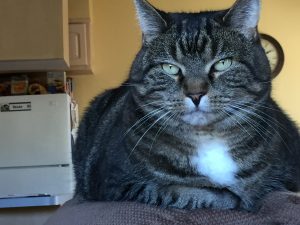One of the questions that Butler’s fiction consistently asks is, “Why are people so relentlessly awful to each other?” In “Adulthood Rites” and “Dawn,” to me one of the answers seems to be that people act this way when they fail to recognize others as people. I’m using the term “people” rather than human, because in the Lilith’s Brood trilogy, Butler uses “human” as more of a way to distinguish those from earth from the Oankali. In my definition of it, “people” includes any complex living being with thoughts and desires.
The raiders who kidnap Akin pick him up by his arms and legs, threaten to poison him for their amusement. They call the Oankali “worms,” highlighting the disgust and fear they feel towards them. Mateo kills the remaining raiders except for Damek because he can only see them as those who murdered his son, and not as Akin does, as people. The Oankali suggest that this lack of respect for personhood is due an inherent hierarchical nature at odds with intelligence. I don’t think I agree with that, but it’s impossible not to see how the failure to regard someone else as a person may impact my own life.
This is a small moment. It does not compare to what the characters of Lilith’s Brood have gone through. But I’ve experienced what I think of as the opposite to Butler’s Aha! moment. When my housemates come home late, they are often extremely loud in the kitchen right above my bedroom. I ask them to keep it down. They respond curtly and often continue to be loud after I go back to my room, knowing that I won’t have the energy to start a fight. I realized that my roommates, by explicitly refusing my requests, pushed aside my right to go to sleep to that they may be loud. In that moment, they do not regard me as a person, but as an obstruction to their fun, not a need. Like I said, I in no way want to equate this with what the people in Lilith’s Brood—and not just in Butler’s fiction, but in the real world—experience. Regardless, these moments of being denied personhood are unsettling and jarring, isolating and miserable.
But I think we should remember when we experience these moments that when Butler wrote Lilith’s Brood, she was still writing “save the world” fiction. Even when horrible things happen in Butler’s fiction, there are still moments of care and tenderness. I can’t get Saidiya Hartman’s quote out of my head, that “care is the antidote to violence.” Dr. McCoy pointed out that, in the devastating aftermath of violence in “Dawn,” the Oankali brush insects off Lilith. The raiders begin to carry Akin properly and listen to him when he speaks. The villagers in Phoenix knit clothes for Akin and Shkaht and Amma.
I was home recently. I have a cat named Pirlo. She came up to me when I was lounging across my bed and I thought she would jump atop me like she normally does. Instead, she paused right by my side, stared at me for a little bit, and then started sniffing me, very gently, her nose barely brushing me. Then she, with the same gentleness, poked her paw across my stomach. I realized that she was investigating me in the same way that Baba and Octavia Butler investigated each other in Butler’s Aha! moment. Butler said in the article, “I’ve known since I was barely three, sitting on the stairs with Baba, that is better—much more interesting—to get to know others and discover who and what they are. It is better to look into their eyes with open curiosity and learn once more about someone else.”
Eventually, my cat did climb on top of me, falling asleep. Whereas sometimes it’s impossible to forget moments where someone else disregarded your personhood, in moments like these, it’s impossible to forget that “care is the antidote to violence.”
PS—A nice picture of my cat

